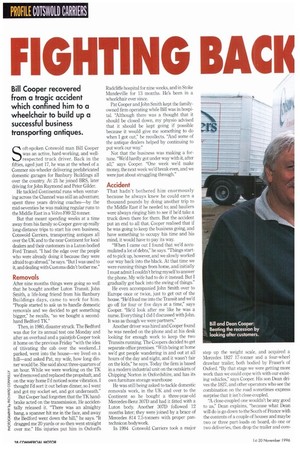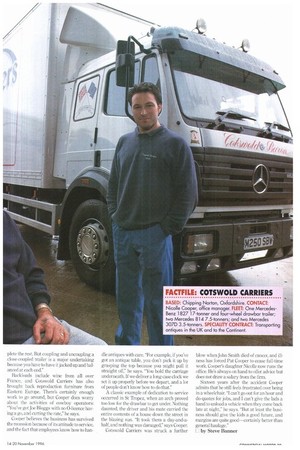FIGHTING BACK
Page 40

Page 41

If you've noticed an error in this article please click here to report it so we can fix it.
Soft-spoken Cotswold man Bill Cooper was an active, hard-working, and wellrespected truck driver. Back in the fifties, aged just 17, he was at the wheel of a Conuner six-wheeler delivering prefabricated domestic garages for Banbury Buildings all over the country At 21 he joined BRS, later driving for John Raymond and Peter Gilder.
He tackled Continental runs when venturing across the Channel was still an adventure; spent three years driving coaches—by the mid-seventies he was making regular runs to the Middle Fast in a Volvo F89 32-tormer.
But that meant spending weeks at a time away from his family so Cooper gave up really long-distance trips to start his own business, Cotswold Carriers, transporting antiques all over the UK and to the near Continent for local dealers and their customers in a Luton-bodied Ford Transit. "I had the edge over the people who were already doing it because they were afraid to go abroad," he says. "But I was used to it and dealing with Customs didn't bother me."
Removals
After nine months things were going so well that he bought another Luton Transit. John Smith, a life-long friend from his Banbury Buildings days, came to work for him. "People started to ask us to handle domestic removals and we decided to get something bigger," he recalls, "so we bought a secondhand Bedford TK" Then, in 1980, disaster struck. The Bedford was due for its annual test one Monday and after an overhaul and a paintjob Cooper took it home on the previous Friday "with the idea of titivating the cab over the weekend...I parked, went into the house—we lived on a hill—and asked Pat, my wife, how long dinner would be. She said about three-quarters of an hour. While we were working on the TK we'd removed and replaced the propshaft, and on the way home I'd noticed some vibration. I thought I'd sort it out before dinner, so I went and got my socket set, and got underneath."
But Cooper had forgotten that the TK handbrake acted on the transmission. He accidentally released it. "There was an almighty bang, a spanner hit me in the face, and away the Bedford went down the hill," he says. "It dragged me 20 yards or so then went straight over me." His injuries put him in Oxford's Radcliffe hospital for nine weeks, and in Stoke Mandeville for 13 months. He's been in a wheelchair ever since.
Pat Cooper and John Smith kept the familyowned firm operating while Bill was in hospital. "Although there was a thought that it should be closed down, my physio advised that it should be kept going if possible because it would give me something to do when I got out," he recollects. "And some of the antique dealers helped by continuing to put work our way" Not that the business was making a fortune. "We'd hardly got under way with it, after all," says Cooper. "One week we'd make money, the next week we'd break even, and we were just about struggling through."
Accident
That hadn't bothered him enormously because he always knew he could earn a thousand pounds by doing another trip to the Middle East if he needed to; and hauliers were always ringing him to see if he'd take a truck down there for them. But the accident put an end to all that. Cooper realised that if he was going to keep the business going, and have something to occupy his time and his mind, it would have to pay its way.
"When I came out I found that we'd accumulated a lot of debts," he says. "Things started to pick up, however, and we slowly worked our way back into the black. At that time we were running things from home, and initially I must admit I couldn't bring myself to answer the phone. My wife had to do it instead. But! gradually got back into the swing of things."
He even accompanied John Smith over to Europe once or twice, just to get out of the house. "He'd load me into the Transit and we'd go off for four or five days at a time," says Cooper. "He'd look after me like he was a nurse. Everything I did I discussed with John. It was as though we were partners."
Another driver was hired and Cooper found he was needed on the phone and at his desk looking for enough work to keep the two Transits running. The Coopers decided to get separate office premises. "With being at home we'd got people wandering in and out at all hours of the day and night, and it wasn't fair on the kids," he says. Today the firm is based in a modern industrial unit on the outskirts of Chipping Norton in Oxfordshire, and has its own furniture storage warehouse He was still being asked to tackle domestic removals work, in the UK and over to the Continent so he bought a three-year-old Mercedes-Benz 307D and had it fitted with a Luton body. Another 307D followed 12 months later; they were joined by a brace of Mercedes 814 7.5-tonners with proper pantechnicon bodywork.
In 1994 Cotswold Carriers took a major step up the weight scale, and acquired a Mercedes 1827 17-tonner and a four-wheel drawbar trailer, both bodied by Fraser's of Oxford. "By that stage we were getting more work than we could cope with with our existing vehicles," says Cooper. His son Dean drives the 1827, and other operators who see the combination on the road sometimes express surprise that it isn't close-coupled.
"A close-coupled one wouldn't be any good to us," Dean explains, "because what Dean will do is go down to the South of France with the contents of a couple of houses and maybe two or three part-loads on board, do one or two deliveries, then drop the trailer and corn plete the rest. But coupling and uncoupling a close-coupled trailer is a major undertaking because you have to have it jacked up and balanced at each end."
Backloads include wine from all over France, and Cotswold Carriers has also brought back reproduction furniture from Eastern Europe. There's certainly enough work to go around, but Cooper does worry about the activities of cowboy operators: "You've got Joe Bloggs with no 0-licence having a go, and cutting the rate," he says.
Cooper believes the business has survived the recession because of its attitude to service, and the fact that employees know how to han
dle antiques with care. For example, if you've got an antique table, you don't pick it up by grasping the top because you might pull it straight off," he says. "You hold the carriage underneath. If we deliver a long-case clock we set it up properly before we depart, and a lot of people don't know how to do that."
A classic example of dedication to service occurred in St Tropez, when an arch proved too low for the drawbar to get under. Nothing daunted, the driver and his mate carried the entire contents of a house down the street in the blazing sun. "It took them a day-and-ahalf, and nothing was damaged," says Cooper.
Cotswold Carriers was struck a further blow when John Smith died of cancer, and illness has forced Pat Cooper to cease full-time work. Cooper's daughter Nicolle now runs the office. He's always on hand to offer advice but does not draw a salary from the firm.
Sixteen years after the accident Cooper admits that he still feels frustrated over being in a wheelchair. "I can't go out for an hour and do quotes for jobs, and I can't give the lads a hand to unload a vehicle when they come back late at night," he says. "But at least the business should give the kids a good future, and margins are quite good—certainly better than general haulage."
I by Steve Banner
















































































































